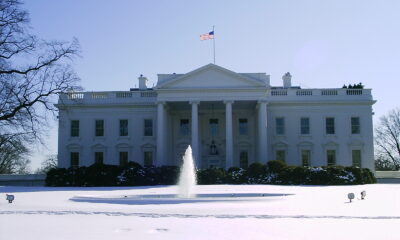Executive
Fracking and the Election: It’s Not About Pennsylvania
The question for Vice-President Kamala Harris is not about fracking but about the overall policy calculated to make energy more expensive.

Vice President Kamala Harris’s changing statements on fracking have become an important issue in the current U.S. presidential election campaign. Only five years ago, Harris pledged to ban fracking, a drilling technique that has helped make the U.S. the world’s top producer of oil and natural gas. Today, the Democratic nominee says she supports fracking, with many political analysts attributing the shift to the political importance of winning Pennsylvania’s electoral votes. Pennsylvania is a major center of U.S. natural production through fracking.
Fracking issue goes beyond Pennsylvania
However, the issue goes well beyond Pennsylvania; it also has vast implications for the U.S. economy and energy security of the U.S. and its allies. Moreover, fracking can also be restricted indirectly, without a formal ban. Indeed, the Biden-Harris administration has limited fracking by indirect means, such as special taxes on natural gas production and halting new exports of liquefied natural gas (LNG). Thus, the question to Vice-President Harris should not be, will you halt fracking, but will you continue the Biden-Harris administration policies that curb natural gas production and have made production more expensive.
To be sure, the question of whether Harris will adhere to her 2019 commitment to “ban fracking” is relevant to in Pennsylvania, widely viewed as the most important battleground state and home to 20% of U.S. natural gas output. Fracking provides more than 100,000 jobs to Pennsylvania residents and generates more than over forty billion dollars in state revenue. No doubt Harris’s views on fracking will affect her prospects for election in the Keystone State.
However, limitations on natural gas production through fracking, also affect all Americans. The significant increase in natural gas production beginning in the early 2000s enabled by fracking, has helped greatly lower U.S. electricity and heating costs. This has given America an important competitive edge in manufacturing, enticing many companies to relocate to the U.S. from Europe and other places where energy costs are higher.
Net natural gas exporter
Fracking has turned the U.S. into a net natural gas exporter, which has brought in revenue and generated jobs. The U.S. emergence as the top producer of natural gas and top global exporter of LNG has also carried significant geopolitical ramifications, enabling the U.S. to guarantee reliable gas supplies to allies and making the gas accessible to developing economies to substitute coal, such as Pakistan. Europe was able to weather several winters after Russian gas supplies dwindled following its Ukraine invasion, due to a surge in U.S. LNG exports.
As part of its climate agenda, the Biden-Harris administration imposed extensive limitations on U.S. natural gas production, while not explicitly banning fracking. These measures raised costs and thus reduced investment attractiveness of U.S. natural gas production. As part of their limitations on natural gas, the Biden-Harris administration imposed a “methane” tax (methane is the main component in natural gas) as part of the 2022 Inflation Reduction Act, the administration’s feature climate law. In addition, the administration imposed a slew of new regulations on methane, that added many layers of bureaucracy to natural gas production, which both generates costs and cause production delays.
The Climate Change Bogey-man
To gain favor with young voters by boosting its climate credentials, in January the Biden-Harris administration halted new permits for LNG export to countries that do not have free trade agreements with the U.S., and thus require federal government approval. In July, a federal court overturned the ban, but since then no new permits have been issued. Almost counterintuitively, a ban on LNG exports can lead to long-term price increases in the American natural gas market, since without new export as an anchor for demand, some investors are likely to flee and thus production could decrease in the U.S.
In addition, the Biden-Harris LNG export ban has raised questions about whether the U.S. can be counted on as a reliable supplier; in its wake several potential customer countries signed new import agreements with Qatar and Oman. Even if the ban is eliminated in the future, the decision shook the international gas market, as importers understood that a change in a U.S. administration or policy could put their energy supplies at risk.
For Pennsylvania and beyond
Low natural gas prices are essential to lowering inflation and retaining an American manufacturing edge. Natural gas prices feed into the costs of almost all products, since natural gas is the major source of electricity in the U.S. A rise in power cost, translates to a rise in the costs of manufactured goods. In addition, natural gas is the feedstock of fertilizer, thus price rises in natural gas, translate to higher food costs.
Thus, the real question to ask Vice President Harris is whether she will continue the Biden-Harris polices and taxes that affect natural gas production and export. The is important to the United States, and not just Pennsylvania. It is relevant not only to jobs in Pennsylvania, but the trajectory of inflation and of the American economy.
This article was originally published by RealClearEnergy and made available via RealClearWire.
Prof. Brenda Shaffer is a faculty member of the U.S. Naval Postgraduate School, Senior Advisor for Energy at the Foundation for Defense of Democracies, and a Senior Fellow at the Atlantic Council’s Global Energy Center.
-

 Accountability4 days ago
Accountability4 days agoWaste of the Day: Principal Bought Lobster with School Funds
-

 Civilization1 day ago
Civilization1 day agoWhy Europe Shouldn’t Be Upset at Trump’s Venezuelan Actions
-

 Executive2 days ago
Executive2 days agoHow Relaxed COVID-Era Rules Fueled Minnesota’s Biggest Scam
-

 Constitution3 days ago
Constitution3 days agoTrump, Canada, and the Constitutional Problem Beneath the Bridge
-

 Christianity Today1 day ago
Christianity Today1 day agoSurprising Revival: Gen Z Men & Highly Educated Lead Return to Religion
-

 Civilization2 days ago
Civilization2 days agoThe End of Purple States and Competitive Districts
-

 Executive2 days ago
Executive2 days agoWaste of the Day: Can You Hear Me Now?
-

 Civilization5 days ago
Civilization5 days agoThe Conundrum of President Donald J. Trump










